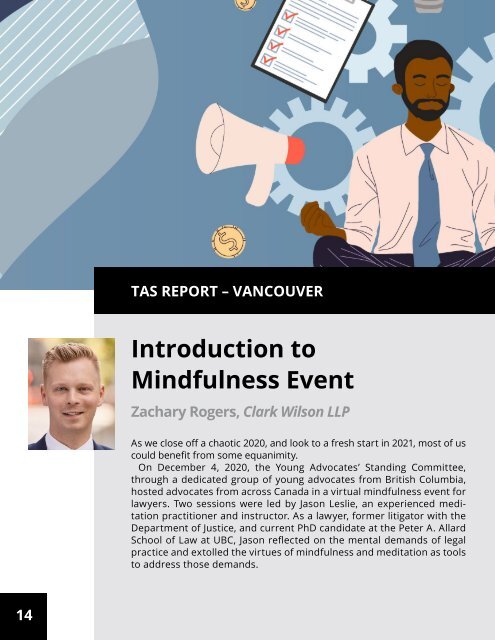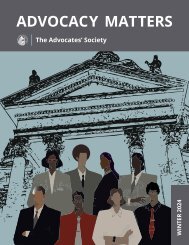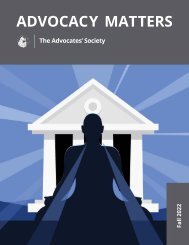Keeping Tabs - Winter 2021
Stay up-to-date on news and events from our Young Advocates' Standing Committee (YASC) with Keeping Tabs.
Stay up-to-date on news and events from our Young Advocates' Standing Committee (YASC) with Keeping Tabs.
Create successful ePaper yourself
Turn your PDF publications into a flip-book with our unique Google optimized e-Paper software.
TAS REPORT – VANCOUVER<br />
Introduction to<br />
Mindfulness Event<br />
Zachary Rogers, Clark Wilson LLP<br />
As we close off a chaotic 2020, and look to a fresh start in <strong>2021</strong>, most of us<br />
could benefit from some equanimity.<br />
On December 4, 2020, the Young Advocates’ Standing Committee,<br />
through a dedicated group of young advocates from British Columbia,<br />
hosted advocates from across Canada in a virtual mindfulness event for<br />
lawyers. Two sessions were led by Jason Leslie, an experienced meditation<br />
practitioner and instructor. As a lawyer, former litigator with the<br />
Department of Justice, and current PhD candidate at the Peter A. Allard<br />
School of Law at UBC, Jason reflected on the mental demands of legal<br />
practice and extolled the virtues of mindfulness and meditation as tools<br />
to address those demands.<br />
Jason explained how mindfulness is often<br />
pitched in the corporate context as a stress-reduction<br />
tool. While mindfulness can reduce<br />
stress, other benefits may include a relaxed<br />
mind, inner peace, and a greater sense of self.<br />
With practice, mindfulness may help you come<br />
to an intuitive understanding of how your<br />
mind works, and may also help you cultivate<br />
equanimity (a state of psychological stability<br />
and composure which is undisturbed by experience<br />
of or exposure to emotions, pain, or other<br />
phenomena). As litigators, much of our work<br />
may be “reactionary” and equanimity may help<br />
to address that.<br />
After introducing the participants to mindfulness,<br />
Jason led two sessions:<br />
1. Shamatha (calm-abiding) - in this session, the<br />
participants sat comfortably and focused on<br />
their breath. Each time the participants caught<br />
themselves thinking of something else they<br />
drew their focus back to their breath. This “repetition”<br />
steadies, composes, unifies, and concentrates<br />
the mind.<br />
2. Vipassana (insight practice) - in this session,<br />
instead of focusing on their breath, the<br />
participants observed and identified the emotions,<br />
thoughts, and judgments they were experiencing.<br />
After they acknowledged those<br />
emotions, they were to consciously “let go” of<br />
them. With practice, this technique allows the<br />
practitioner to keep their mind from repeating<br />
patterns of thoughts that take up space<br />
and hold them back.<br />
I personally found both sessions challenging<br />
since it is not an easy thing to “turn off” as a<br />
lawyer. I can however see great benefits of<br />
mindfulness with continued practice.<br />
I definitively recommend people to give<br />
mindfulness a try. No equipment is needed.<br />
You simply need a few minutes to spare, the<br />
willingness to “look inward”, and the desire to<br />
live with intention.<br />
For those interested in learning more about<br />
mindfulness, Jason recommends “The Wise<br />
Heart” by Jack Kornfield, and “Mindfulness: A<br />
Practical Guide to Awakening” by Joseph Goldstein.<br />
Finally, to join an existing meditation group,<br />
check out the BC Insight Meditation Society at<br />
https://www.bcims.org/sitting-groups .<br />
14 15


















